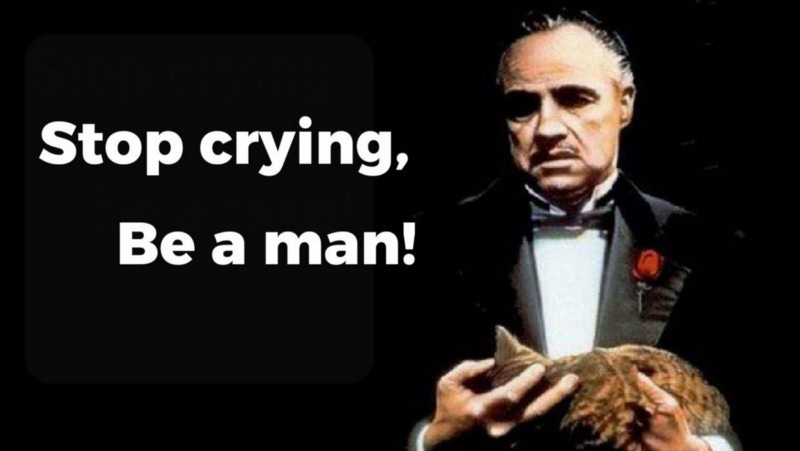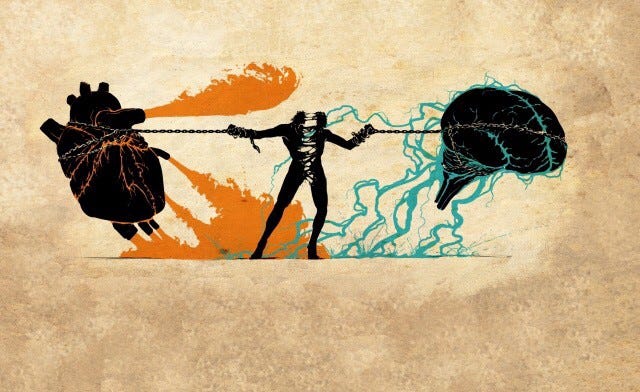Why cut emotions out of my life, and how I found them again
A reflection on my journey with emotions.
I remember like it was yesterday — the first seed that was planted in me that said, “It’s NOT okay for men to show emotions.”
I was 4 years old, my toy water gun had just broken and I started crying. My grandma said in Cantonese, “Boys don’t cry!” and that was the first time I shut down my feelings.
Subtly ingrained into my psyche over the years, I remember starting to cry a few times as a teen and immediately, ruthlessly telling myself, “Don’t be a wimp. Be a man, suck it up!” and then trying to suck up my tears back into their tear ducts in fear I had just lost of bit of my manhood.

That became a subtle script that gained momentum through interactions I had with men over the years and echoed through movie portrayals of rugged men who never shed a tear. They all seemed to reinforced that:
Emotions were for women
Emotions are a hassle to be “managed”
Emotions held you back, you make stupid decisions because of them
Emotions make you weak
Emotions and logic are diametrically opposed, they cannot coexist in the same environment
And that was combined with the unfortunate reality that I never had any healthy emotional role models who could show me how to process emotions in a healthy way, how to wield it from a place of strength, or what place they could have in my life.
I remember a distinct conversation I had with my sister when I was 17, I said, “If I can just learn how to not make an emotional decision, my life would be perfect” and I spent the next few years shutting my emotional processes down, never intending to open myself to it again.

Real footage of me as a teen =O
By the time I was 21, I had learned to keep most of my feelings under wraps, I learned to funnel them all into a cage in the name of “logic” and I prided myself on being a robot. It also became my reputation for a time — stable, like a rock, never swayed — for better or worse.
In retrospect, I probably swung the pendulum too far.
3 years later, I never expected to find myself on a Caribbean island, with people I had only previously known through Facebook, diving back into the world of emotions.
In May of 2015, I attended a retreat my friend Kim Nicol was hosting.
The last evening of the retreat, I had a very long conversation with Teresa Torres, and I credit her with being so patient with me in hand-holding me back into the world of emotions again. I was curious to see if it’d be possible to make a safe return without the baggage I had before and at the same time, skeptical, as to whether it was even possible.
Teresa gave me 2 very specific things to hold onto as foundations.
The first was a way to see how emotions were ALREADY a part of my life — I just hadn’t given them the credit they were due. And, not only that, she gave me a way to understand it in my physical body.
Head. Heart. Gut.
Head. She asked me if I ever had a really hyper-intellectual conversation. Totally. Been there before. I knew exactly how it *felt.*
Heart. She asked me if I ever had a vulnerable, deep, connective conversation. Yes. Countless times! I guess feelings were far more present in my life than I had realized.
Gut. She said the most easily recognizable feeling here was injustice. Oh yeah. I’ve been profoundly provoked by things that are wrong with the world and the pain and struggle people close to me have endured.

(Image from TriBrainYoga)
My mind was blown by how clear cut those were and how easily they mapped to experiences in my life.
I still had one concern, and this led to her second point.
“How do I not let emotions take over my life?”
“Emotions are just another data point. They’re information you can use.”
Click. Eureka. Aha. Boom. Dude.
Hearing that allowed me to feel like I could safely welcome emotions back into my life in a healthy manner — something I could embrace without wrecking myself. Ultimately, I was scared of being so strongly swayed by them that I would neglect my logic.
For the next 2–3 hours, Teresa helped me make sense of things as I connected dots upon dots in terms of how emotions had been a part of my life all along, where else I could incorporate it, and how to articulate what I was feeling.
Forever grateful for that experience it has changed my life in so many ways I never could have predicted.
That experience kicked off a long journey of practice that has affected my life in a whole multitude of ways.
Concrete ways “unlocking” emotions has changed my life
Before: I never would have touched the dance floor. I was rigid, I overthought, I didn’t know how to dance “well” or “correctly” so I avoided trying it at all to save myself any embarrassment.
After: I now secretly dance and rock out to random songs that get stuck in my head when I’m by myself (shhh don’t tell anyone). I ended taking my first dance class EVER (hip-hop) because I realized how connected emotions were to dance. I am now far more concerned about sweating too much on the dance floor more than anything else…
Before: I didn’t understand art. I didn’t see the point.
After: Andrea brilliantly explained it to me at the time, haven’t forgotten it. The purpose of art is to elicit a feeling. And feelings can convey so much more context than a paragraph could. Art is meant to provoke a feeling.
Before: Didn’t understand when women would talk about their feelings
After: OMG I GET IT WHEN THEY SAY THEY WANT AN EMOTIONAL CONNECTION.
Before: Thought that I was supposed to solve the problem that caused the feelings.
After: Realized that feelings are meant to be heard and understood, first, problem solving can come after.
Before: Would respond with what I was thinking when someone asked, “How are you feeling?” and I’d be oblivious to the fact that I wasn’t answering the question.
After: I still kind of do that xD, but I’m usually conscious of it and know how to re-answer the question with what I’m feeling.
In brief, allowing myself to feel again has had a huge impact on my creative expression, my ability to simply enjoy life, my ability to connect with friends and romantic partners, and my ability to make life decisions.
My intention in sharing all of this is to hopefully inspire those who have shut emotions down like I did, a possible way back. And maybe for those who would never shut their feeling down, see a completely different perspective about it.
My hunch is that it’s more common than we might realize, but I could be wrong!
On Masculinity and Emotions
I remember wrestling with my sense of masculinity in the midst of rediscovering emotions.
I had to confront all the old scripts and memories from my youth that all seemed to say that emotions were NOT for men. How could I reconcile them with my rediscovery?
There was a part of me that thought, “Does this make me less of a man? What if other men judge me for being ‘in touch’ with my emotions?”
And it made me hesitate for a second.
And then I remembered the quote, “People will forget what you said, people will forget what you did, but people will never forget how you made them feel.”
And I remember resonating with it, and noticed the distinction, or lack thereof. It didn’t say, “WOMEN will never forget how you made them feel” or “MEN will never forget how you made them feel.” It said, “People.”
Emotions are fundamentally a human experience. To distinguish them as a ‘masculine’ or ‘feminine’ experience would be to sell ourselves short of what we can experience as humans. And that was another perspective that helped me embrace it again with open arms.
I am human. And my goal is to become a fuller human, not necessarily a fuller “man.” I mean… the definition of ‘manliness’ is so fluid anyway.
Where I Stand Now
Circling back to the initial beliefs I had formed about emotions:
Emotions were for women
Emotions are a hassle to be “managed”
Emotions held you back, you make stupid decisions because of them
Emotions make you weak
Emotions and logic are diametrically opposed, they cannot coexist in the same environment
My revised perspective about this is now:
Emotions are an integral part of the human experience
Emotions are useful if you take the time to understand what they signal
Emotions empower you, you make wiser and quicker decisions if you wield them correctly
Emotions make you more resilient, empathic, relatable, and strong
Emotions and logic can be paired, they can thrive in the same environment
Resource for Emotional Fluency
The most epic class I’ve ever taken is called Interpersonal Dynamics, taught at Stanford.
You can learn more here.
You don’t need to be a student at Stanford, it’s open application (also true with their continuing education COM-19 class)
My friend Norman, who introduced it to me and was also a facilitator for them, would say of the class, “It teaches MBAs how to cry.”
It sounds like hyperbole, but, it actually isn’t.
I took the class TWICE because it was so life-changing for me.
Teresa’s introduction to emotions was like the equivalent of learning the 500 most common words in the English language.
The Interpersonal Dynamics class was like the equivalent of being a fly on a wall with world-class authors in a room, listening to them linguistically spar with each other, exposing me to how masters use the same language to convey a point.
It wasn’t expected, but both times I took the class, I ended up crying. And not just me, pretty much every participant cried.
The class was not only powerful in terms of increasing my capacity to feel, but also therapeutic in helping identify and name parts of my childhood that were incredibly painful.
If you are wanting to know more about my personal experience with this specific class, please feel free to message me, happy to talk about it.
Want to chat about emotional fluency?
I would thoroughly enjoy connecting with other people who want to grow more in this area, and perhaps, relate to parts of my journey.
I don’t consider myself an expert by any stretch, but I consider myself really good at breaking down things that I have learned into digestible bits.
Please feel free to fill out this 30-second form if you’re interested to chat. If enough people reach out to me about this, I would consider starting some kind of group to support people who want to grow in this way and perhaps bring in Norman along to help :)
—
What are your experiences with emotions?
What are your reactions to my story?
Curious if there are people who resonate with my experience.